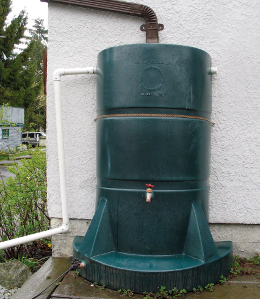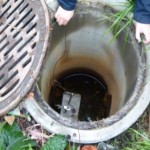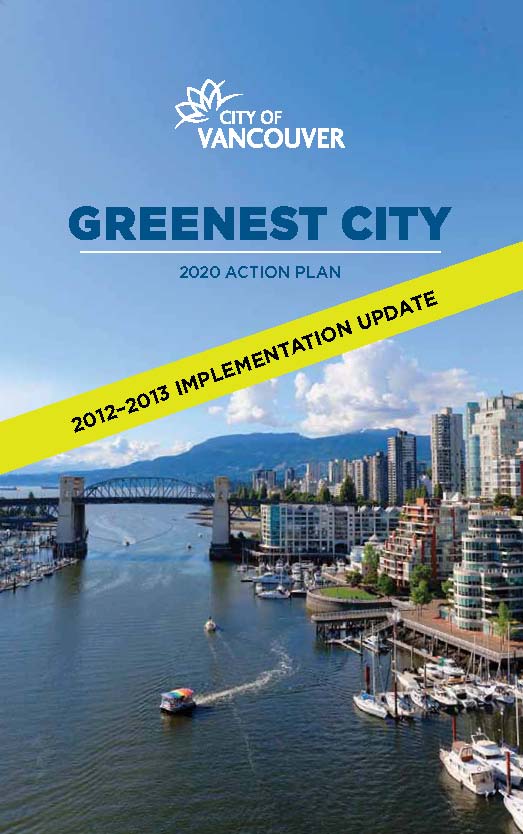Embracing Seasonal Rainwater in the City of Vancouver: Community-Scale Project Enhances Resiliency
Note to Reader:
On December 3, 2013 the Partnership for Water Sustainability and the Irrigation Industry Association of BC (IIABC) are co-hosting a workshop that will explore regulatory requirements, water balance benefits and practical applications of rainwater harvesting design and operation. The workshop is structured as four cascading modules.
In the second of four modules, the team of Kirk Stinchcombe, Carolyn Drugge and Richard Boase will speak to the benefits of utilizing rainwater as a resource in the urban environment. Below is a preview of the perspective that Carolyn Drugge will provide when she elaborates on community-scale initiatives that are designed to enhance resilience in the infrastructure system and in the community.
TO REGISTER for the workshop, go to the IIABC website: https://www.irrigationbc.com/irrigation/courses/view_scheduled/119
TO DOWNLOAD a copy of the Program Overview, click on Get Your Mind Into the Gutter: A Workshop on Rainwater Harvesting in British Columbia.
Embracing Seasonal Rainwater: Project will raise community awareness of urban water cycle
Under the umbrella of the Greenest City: 2020 Action Plan, the City of Vancouver is developing a city-wide integrated rainwater management plan founded on a whole systems approach that embraces the ecological principles of rainwater management. The plan will provide a toolbox of rainwater management techniques categorized by the appropriate land use, neighbourhood location, or project type where they are most relevant.
“The City of Vancouver’s Embracing Seasonal Rainwater Project is not the fabled silver-bullet solution to addressing system capacity or climate change adaptation issues; but it does have the potential to address multiple objectives in making  communities more livable over the long term, states Carolyn Drugge, Senior Policy Analyst for the City of Vancouver’s Water & Sewer Division.
communities more livable over the long term, states Carolyn Drugge, Senior Policy Analyst for the City of Vancouver’s Water & Sewer Division.
“This project has the potential to improve storm (and rain) water management, increase the use of rainwater for irrigation, raise awareness of the urban water cycle among residents, and protect the receiving waters from combined sewer overflows.”
“The City of Vancouver is working to eliminate combined sewer overflows by twinning the storm and sewer mains. However, this is expensive work and cannot be done quickly. The reduction of overflows can be aided by community-scale efforts that provide immediate benefits and raise community awareness of the urban water cycle.”
Function of Rain Barrels
 “Rain barrels will facilitate the use of rainwater for irrigation, reducing potable water demand,” continues Carolyn Drugge.
“Rain barrels will facilitate the use of rainwater for irrigation, reducing potable water demand,” continues Carolyn Drugge.
“This project will reduce peak flows in Vancouver’s combined sewer system and facilitate the use of rainwater for outdoor irrigation.”
“The project will see the distribution and installation of up to 300 rain barrels in a selected neighbourhood in Vancouver. These rain barrels will be modified to allow the captured rainwater to slowly drain to the storm sewer in the rainy season, thereby reducing the peak flow of the rain event.”
“Reducing the peak flow during a storm event is one way to reduce combined sewer overflows – this occurs when the volume of storm water exceeds the system’s capacity and causes an overflow of untreated sewage into the water bodies that surround Vancouver.”
“Vancouver is required to eliminate Combined Sewer Overflows by 2050; this project will support the sewer separation program to achieve this goal faster.”
Scope of Flow Monitoring Program
“To measure the storm sewer flows, flow monitors will be installed. Throughout the year, these monitors will measure the volumes of water in the storm sewer serving  the affected neighbourhood,” reports Carolyn Drugge.
the affected neighbourhood,” reports Carolyn Drugge.
“Additionally flow monitors will measure the volume of water in the storm sewer that serves a similar neighbourhood that has not received the rain barrels. The difference of the flows from the two neighbourhoods will reveal the effectiveness of the rain barrels in reducing the peak flows, and inform the decision to implement on a broad scale.”
Expected Benefits
“In the growing season the rain barrel will retain the rainwater for irrigation purposes. This is expected to contribute to the water conservation target of reducing water consumption by 33% by 2020 as detailed in Vancouver’s plan to become the greenest city in the world by 2020.”
“An additional key benefit of this project will be raising the awareness of the urban water cycle among the residents taking part in the project. This project will make the role that individual homes play in the urban water cycle immediately visible to the resident participants,” concludes Carolyn Drugge.
To Learn More:
For additional information about the City of Vancouver’s goals and targets, click on the 2012-2013 Implementation Update for the Greenest City: 2020 Action Plan. While the Embracing Seasonal Rainwater Project is not mentioned directly, it is an example of action on the ground to achieve desired outcomes.



